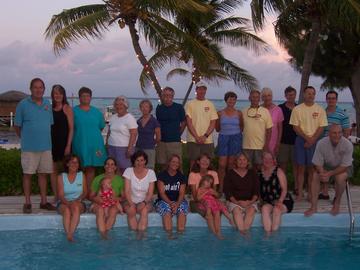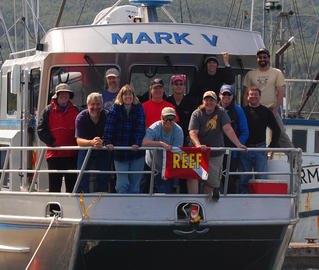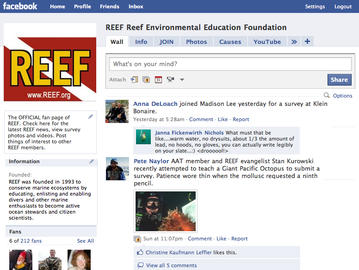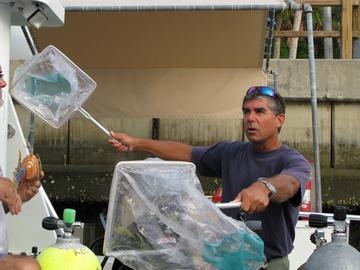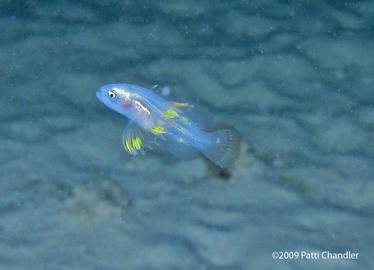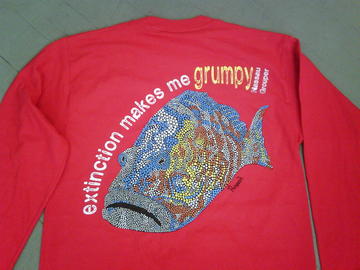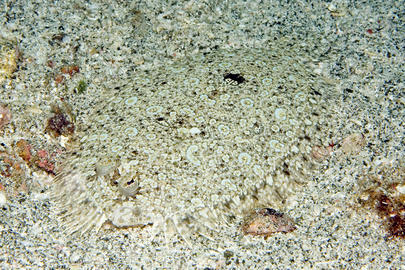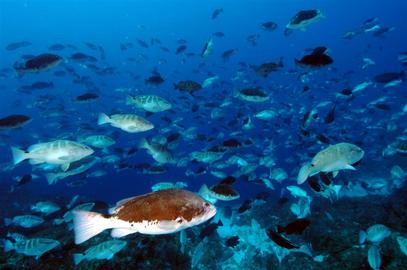Author: REEF Staff
We are excited to announce a great line-up of destinations for REEF's 2010 Field Survey Travel Schedule. These fun and educational eco-dive trips are part of REEF's Volunteer Survey Project and they are the perfect way to "Make a Dive That Counts". The week-long trips are a great introduction to fish identification for novice fishwatchers, and a fun way for experienced surveyors to build their life list while interacting with fellow fishwatchers. Trips are led by REEF staff and other REEF instructors and feature daily classroom seminars and a full diving schedule. We are featuring several new destinations, including the northern Baja Peninsula and Roatan, as well as returning to some of our member's favorites like Dominica and Grand Cayman. Several specialty trips are also being offered in 2010, including invasive lionfish research projects and reef fish behavior tours.
REEF Trip Schedule 2010 -- Prices, package details and more available soon.
Dominica with Dive Dominica and Ft. Young Hotel -- April 17-24, 2010. Led by Heather George.
Belize with Sun Dancer II Liveaboard -- May 1-8, 2010. Lionfish Research Expedition, Led by Lad Akins and Peter Hughes.
Bahamas with Aqua Cat Liveaboard -- June 12-19, 2010. Led by Ned and Anna DeLoach.
Roatan with Turquoise Bay Resort -- July 17-24, 2010. Led by Paul Humann.
Cozumel with Aqua Safari and Safari Inn -- August 14-21, 2010. Led by Sheryl Shea.
Key Largo with Amoray Dive Center -- August 26 - September 2, 2010. Sea Critter Seminar, Led by Ned and Anna DeLoach.
Bonaire with Buddy Dive Resort -- September 26 - October 2, 2010. Field Survey and Coral Spawning Expedition, Led by Jessie Armacost.
Sea of Cortez/Baja Mexico with Rocio del Mar Liveaboard -- October 9-16, 2010. Led by Drs. Christy and Brice Semmens.
Grand Cayman with Dive Tech and Colbalt Coast -- November 6-13, 2010. Led by Lad Akins.
To inquire about a trip and to book your space, please contact our REEF Dedicated Sales Consultant at REEF@caradonna.com or by phone at 1-877-295-REEF(7333). Additional details will be added to the REEF Trips webpage soon, so check back often. Book early, trips often fill up!
Share on Facebook
Author: Janna Nichols and David Jennings (REEF Pacific Advanced Assessment Team Members)
REEF's Pacific Northwest Advanced Assessment Team (AAT) gathered in mid-August to survey fish and invertebrate life in the Olympic Coast National Marine Sanctuary (OCNMS). Twelve divers conducted over 120 REEF surveys in the week-long project on Washington's northwest coastline, gathering data to add to the previous 7 year's worth that the project has generated. Twelve sites were surveyed by the divers. The Sanctuary is home to many colorful fish and invertebrates and is a popular spot for sport diving. It is also a popular spot for fishing and there is concern that biodiversity has been diminishing in the area, especially in some species of long-lived rockfish such as Tiger and China Rockfish. Data collected by the AAT will be helpful in tracking these population trends.
Members of the OCNMS REEF survey team were treated to a great week of diving and lots of exciting sights in this remote and wild part of Washington State. Whales were seen every day. Basket stars and giant pacific octopus were encountered by many. And about half the team conducted an optional night dive to remember off of Tatoosh Island in the open Pacific surrounded by Stellar Sea Lions. Projects like the annual OCNMS monitoring are a great way for active REEF volunteers to apply their skills and expertise. These projects are also just one more reason for REEF surveyors to improve their identification skills and increase their survey experience level.
A big thank you to the participating AAT members: Claude and Janna Nichols, Ron and April Theod, Jeanne Luce, David Jennings, Greg Jensen, Todd Cliff, Nick Brown, Pete Naylor, Lorne Curran and Stan Kurowski. Thanks to Mike Furguson and his great crew at Porthole Dive Charters and to Winter's Summer Inn for supporting the project. Funding for the project was provided by The Sustainable Path Foundation and The Russell Family Foundation.
Share on Facebook
Author: Christy Pattengill-Semmens, REEF Director of Science
We are excited to announce the launch of the *official* REEF Facebook page -- Become a Fan of REEF today. The REEF Facebook Page gives you the latest information about REEF's programs and events, our marine conservation work, and see exclusive content and stories. It's also a great place for our members to post pictures, fish stories and whatever is on their mind. We're building a strong community to conserve marine ecosystems by educating, enlisting and enabling divers and other marine enthusiasts to become active ocean stewards and citizen scientists. And we want you to join us!
To Become a Fan: Go to REEF's Facebook page, log in to your Facebook account, and click Become a fan at the top of the page. Or just click on the "Become a Fan" link in the box below. If you don't have a Facebook account, sign up for one.
Please help us spread the word about REEF. Click the Share button on the REEF Facebook page or the Cause to post them to your wall. To find the Share button, look on the bottom left side of the REEF Facebook page. Thank you for helping us build our online community and for supporting our mission to conserve marine ecosystems!
REEF staff and Board of Trustees would like to extend a big thank you to REEF member Park Chapman for all of his help in getting REEF's Facebook Page up and running. And thanks to our first 200+ fans who have already become a part of our online community.
Author: Lad Akins, REEF Director of Special Projects
As part of REEF's efforts to increase awareness about the invasive lionfish, train removal teams and develop regional response plans, REEF recently conducted a series of workshops, talks and lionfish removals in partnership with the Gray's Reef National Marine Sanctuary (GRNMS) in Georgia and the Cozumel Marine Park in Mexico. Combined the two projects held in July 2009 included 15 talks to more than 370 people.
The Gray's Reef project included a meeting of Sanctuary personnel from the Florida Keys, Flower Garden Banks and Gray's Reef National Marine Sanctuaries, working to develop a regional coordinated response plan. Sanctuary and REEF staff also conducted two days of lionfish collecting and handling dives, including the removal of 54 lionfish averaging almost 30 cm from sites just outside the GRNMS boundaries. Talks to the general public, Sanctuary Advisory Council and Georgia Law Enforcement working groups also helped increase awareness of the lionfish issue and conveyed removal plans for the region.
Immediately following the Gray's Reef project, a week-long series of workshops and talks were held in Mexico to initiate development of the Mexican regional lionfish response plan focusing on the Yucatan. An initial day-long meeting included over 40 representatives, including national environmental regulators, regional marine park directors, conservation and science groups, academia and the Mexican Navy. Presentations and discussions resulted in the development of an early detection/rapid response plan. The plan was then unveiled in numerous public and key user group talks including those to dive operators, fishermen, medical/first responders and university groups. Training dives with Marine Park staff also resulted in the removal of 3 juvenile lionfish from local Cozumel reefs.
To find out more about REEF's Lionfish Research Program and to report a lionfish or other non-native fish sighting, visit the REEF Lionfish Webpage.
Share on Facebook
Author: Patti Chandler, REEF TWA Advanced Assessment Team Member
Active REEF surveyor and Advanced Assessment Team member, Patti Chandler and her husband Scott, recently found a new fish species for Bonaire! Scott and Patti, of ReefNet, were in Bonaire as presenters for the Second Annual Fish ID Challenge. Nearing the end of a lengthy night dive on Bari Reef over sand, in 10 feet of water, something very strange was illuminated by their video lights catching Scott and Patti's eyes. It was a clear fish,1 inch in length, with a rounded tail, and large pectoral fins that practically encircled it, giving it an appearance of wearing a tutu with yellow dots.
The little fish was very active in the water column making photography and videography more of a challenge than usual. This fish was a very young juvenile, more precisely described in the scientific community as post larval in the "settling stage". As they were at a loss for its identification, photos of the strange little fish were sent off for identification to Les Wilk, Head of Scientific Research at ReefNet who in turn sent them to Benjamin Victor, who is the recognized expert for juveniles of any kind, especially larvae. Ben is a frequent poster to the REEF Discussion Forums and has a very useful website, www.coralreeffish.com.
Ben made a positive ID for the wacky little fish. It is a juvenile Reef Bass, Pseudogramma gregoryi! The adult version of the Reef Bass looks totally different. Very few reference guides even mention this obscure but beautiful fish. You can see a photo of the adult at on the bottom of this webpage. The new species was reported on Patti's REEF survey and will be added to the species count for Bonaire. Bonaire's Bari Reef is the ONLY place this fish has ever been reported to REEF in the entire Tropical Western Atlantic! Bari Reef was already the number one reported reef for species diversity in Tropical Western Atlantic and this new species just increases the lead.
The Annual Fish ID Challenge is sponsored by Bonaire Dive & Adventure, Budget Car Rental, ReefNet, and Sand Dollar Condominium Resort for promotion of marine education and conservation.
Share on Facebook
Author: Christy Pattengill-Semmens, REEF Director of Science
REEF friend and world famous painter, diver and character extraordinaire, Ron Steven (aka Rogest), has done it again. After talking with REEF scientists about the REEF Grouper Moon Project and the important conservation research being done to study one of the last remaining spawning aggregations of the endangered Nassau grouper, Rogest created his latest piece of artwork to celebrate this Caribbean icon. "Grumpy" features the face of a Nassau grouper, with the tag line "Extinction Makes Me Grumpy". Rogest completed the painting in early summer 2009.
The artwork is being featured on T-shirts now available for sale in the REEF Gear Store. These high quality, pre-shrunk T-shirts are available in green short sleeve ($25) and red long sleeve ($30). Get yours today, they won't last long.
REEF members will have an exclusive opportunity to purchase the original painting later this Fall and Rogest will be donating over half of the proceeds to the Grouper Moon Project. We extend a big thank you to Rogest for his dedication and passion for REEF's marine conservation efforts.
Author: Christy Pattengill-Semmens, REEF Director of Science
If you are a REEF surveyor in the Tropical Western Atlantic, you are probably familiar with the Peacock Flounder (Bothus lunatus). And if you spend much time in the sand, you probably even know about the smaller Eyed Founder (Bothus ocellatus)? But how about the Spiny Flounder (Engyophrys senta)? Danielle Calini, an Our World Underwater Scholar who spent this summer as an intern at REEF HQ in Key Largo, was one of several REEF surveyors who recently came across this rarely seen species during a dive on Molasses Reef. And while this was the first record of the Spiny Flounder in the REEF Florida Keys database, it turns out this species might not be as rare as we think.
Spiny Flounder are very similar in appearance to the common Eyed Flounder, and it's likely that surveyors might not be looking closely enough when they see the small flatfish scurrying across the sand. It was previously thought that cirri extending from the eyes were a key feature distinguishing the two species but the cirri are very difficult to see. According to Paul Humann, Spiny Founder can be distinguished from Eyed Flounder by three key features:
Eyes very close together.
Large diffuse midbody blotch on lateral line and often two less distinct blotches on lateral line, one in front and one in back of the midbody blotch.
Very small mouth extending back only as far as the front of the lower eye.
Body shape is elongated (vs. nearly circular in the Eyed Flounder).
REEF is proud to host an Our World Underwater Scholar each summer. In addition to tracking down rare species, OWU interns provide much needed help in the REEF HQ office and conduct outreach with the Florida Keys community. The REEF Staff and Board of Trustees extends a big fish thank you to Danielle in appreciation for her service to REEF in the Summer 2009.
Share on Facebook
Author: Christy Pattengill-Semmens, REEF Director of Science
Planning is underway for REEF's annual research on Nassau grouper spawning aggregations in the Cayman Islands for the 2010 spawning season - the Grouper Moon Project. This collaborative conservation program between REEF and the Cayman Islands Department of the Environment is entering its 8th year. Thanks to funding from the Lenfest Ocean Program of the Pew Charitable Trusts, the research team is conducting innovative research that is critical to the long-term survival of this iconic Caribbean species. Grouper Moon scientists will be in the field January 30 - February 12, 2010. If you are looking for a winter getaway and are considering the Cayman Islands, this is a great time to visit Little Cayman.
While there are not opportunities for recreational divers to visit the aggregation, researchers will be giving several public talks and divers on Bloody Bay Wall will witness the mass migrations of the normally solitary Nassau grouper from their home reefs out to the aggregation site. Another good reason -- the acclaimed Southern Cross Club has offered to donate a percentage of any package booked by REEF members during that time to support REEF's Grouper Moon Project. To take a vacation and make a positive impact for the grouper, contact the Southern Cross Club reservation office directly at 1-800-899-2582 or info@SouthernCrossClub.com -- be sure to mention that you are a REEF member!
More information about the 2010 research and program objectives for the Grouper Moon Project will be included in future issues of REEF-in-Brief. you can also find out more about the Project on the Grouper Moon Project Webpage.

